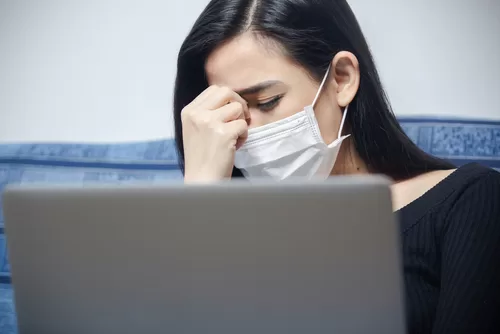How to Survive the Lockdown Blues: An Addict’s Guide

In the prevailing Covid-19 scenario, and consequent lockdown, addiction (to alcohol, drugs and nicotine) is a major concern.
Withdrawal
Availability of alcohol (and drugs) is limited or non-existent, so those with addiction issues are going to go through forced and unforeseeable withdrawal. Withdrawal symptoms can vary from mild to severe. Though it is always recommended that withdrawal is managed under medical supervision, as it can be life-threatening, it may not be possible to access medical support during lockdown. However, online consultation with a medical professional is always an option. So, ensure that you reach out for support if you are experiencing withdrawal.
Withdrawal is not merely physical, psychological withdrawal is also a major concern. Mood fluctuations (irritability) is almost always part of the process and this can cause conflict in relationships with those around you.
Withdrawal symptoms may include irregular of lack of sleep, mood changes, tremors, aches and pains, loss of appetite and other physical issues depending on the health of the individual and duration of addiction.
Some persons may also have co-occurring psychiatric issues such as depression bipolar disorder. A psychiatric evaluation is helpful in successful management of withdrawal. This is also available online.
Relapse
Covid-19 and lockdown restrictions can be highly stressful for everyone. It can have wide ranging psychological impact on individuals, such as: loneliness, strained relationships due to close proximity for prolonged durations, fears, stress and anxiety. Stress is the biggest known trigger for relapse. ‘Lockdown blues’ can be a relapse trigger for those with underlying tendency toward addiction, including those who have been clean and sober for significant durations.
A relapse can be very hard for the individual and the family. For the addict, it is accompanied by shame, guilt and fears. For the family, it is re-awakening of emotions of disappointment, anger and resentment. Slowly, the situation can become a mess.
It is therefore important to recognize and address such issues before they blow up to become big problems.
How to Stay Sane and Sober
Here are some tips on how to remain clean and sober during these extraordinary times:
- Maintain Structure: Keep a daily routine that includes regular and timely activity of sleep, meals and exercise. That way, the body and mind remain balanced.
- Eat healthy: This is always good advice. Avoid junk and sweets – or at least minimize its consumption.
- Get adequate sleep: Avoid late nights, get adequate sleep. Get up early and fresh.
- Get some exercise: Weather it’s on your indoor treadmill or a walk in your garden (if you have one) or Yoga. Keep your body active.
- Get some ‘me time’: Constant interaction can be stressful. Turn of and be with yourself for a while every day.
- Meditate: One of the best ways to remain centered is to practice Mindfulness. Nowadays, there are plenty of apps which can get you started.
- Learn something new: There are abundant online courses available. Upgrade your skills. Or learn something you always wanted. It’s good for your self-worth.
- Attend online meetings: Self-help groups such as Alcoholics Anonymous (AA) have 24/7 meetings available for you to participate. Log on to their website and find out more.
- Talk to your sponsor: Share. Share.
- Get professional help: For any issue such as withdrawal management, stress, anxiety, panic disorders, relationship or marital problems, get in touch with a professional. Hope Trust has qualified and experienced psychologists, psychiatrists and therapists to support you online during these unprecedented times.